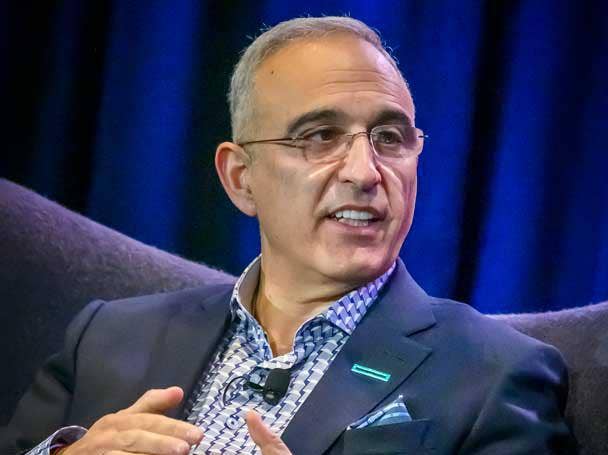HPE’s Antonio Neri: ‘Returning To The Office Will Be Voluntary’
‘Our work from home guidance will not be lifted just because government orders are removed; we will only re-open sites when we feel we are in the best position to welcome back team members safely,’ says Neri in a blog post. ‘We will modify our sites to ensure physical distancing can be maintained, and we won’t all return at once. Most importantly, returning to the office will be voluntary.’

Hewlett Packard Enterprise CEO Antonio Neri says even after HPE decides it is “safe” to return to the office post-coronavirus, doing so will be voluntary for the company’s 60,000 employees.
“Our work from home guidance will not be lifted just because government orders are removed; we will only re-open sites when we feel we are in the best position to welcome back team members safely,” said Neri in a blog post. “We will modify our sites to ensure physical distancing can be maintained, and we won’t all return at once. Most importantly, returning to the office will be voluntary. Our team members’ health and well being remains our number one priority so we want to make sure that everyone feels comfortable, safe and supported.”
HPE has set up a special coronavirus team working hand in hand with a crisis management team that is focused on the virus recovery effort. “One of this team’s first initiatives has been to map out our approach to “return to work” when it is safe to do so,” said Neri.
HPE recognizes, Neri said, that its mission to “advance the way people live and work” is essential in not just how HPE responds to the coronavirus, “but in how we recover from it – and help our customers do the same.”
Paul Cohen, vice president of sales for New York-based PKA Technologies Inc., one of HPE's original Platinum partners, said the voluntary return-to-the-office policy is yet another example of Neri’s strong cultural impact on HPE.
Cohen said he sees Neri, who started in an HPE call center 25 years ago and worked his way up to CEO, as keeping alive the employee and customer first cultural legacy established by HPE founders Bill Hewlett and David Packard.
“Antonio is carrying on the legacy of Bill and Dave and the culture they created,” Cohen said. “Antonio came up through ranks. He appreciates every employee in the company.”
In his blog post titled “Showing Humanity At Its Finest As We Move To Recover,” Neri said technology has never been as important as it is now in order to help the “world weather and emerge from global business disruption, which is happening on a scale and at a pace never seen before.”
HPE sees a “tremendous need and opportunity to help organizations rebuild business models, create new experiences and connect differently,” said Neri.
In fact, he said, the new world demands technology solutions that enable remote work forces, extend connectivity and help organizations “retool” their business models.
Chris Case, CEO of Sequel Data Systems, an Austin, Texas-based HPE partner, said he sees the voluntary return-to-the-office policy from HPE as the new normal.
“I see this happening across the board,” said Case of the move from companies to continue to let employees work from home even after the pandemic ends. “One of my customers has decided to stay working from home permanently. The long term strategy for them is going to be work from home.”
Case expects many customers making it optional for employees to return to the office. That is leading to a explosion in virtual desktop infrastructure (VDI) solutions, he said.
In a blog post titled “The Year of The Virtual Desktop,” Case called 2020 the year of the virtual desktop. “We never imagined the scale of COVID-19’s impact on all business and individuals around the world, and the massive surge in demand for work from home solutions has ranged in complexity,” Case wrote. “What we do now know is that virtual desktop technology has moved from an insurance policy initiative to a core IT competency.”
Customers that had implemented VDI infrastructure moved seamlessly to work at home in the midst of the coronavirus pandemic, said Case.
“We had text messages from customers that implemented our VDI solutions thanking us for saving their companies,” he said. “They were up and running with work at home instantly. It was just flipping a switch.”
Customers that did not have VDI infrastructure in place were “scrambling, working for a couple of weeks non-stop trying to figure out a solution,” said Case, who expects Sequel Data’s VDI business to double over the course of the next year.
When the dust settles from the coronavirus pandemic, all businesses are going to “rethink” their approach to work at home, he said.
“Big companies want better coronavirus testing to make sure their employees feel safe before they bring employees back,” said Case. “They are going to put the brakes on employees returning to office until they feel it is safe. They are going to make their own decision regardless of state return to work policies.”